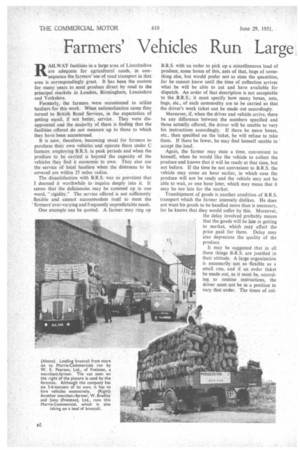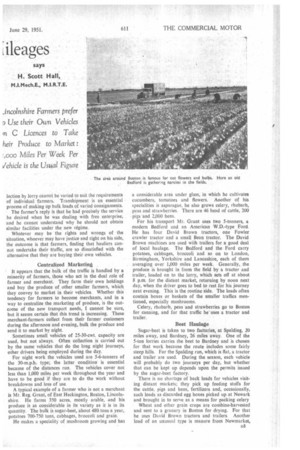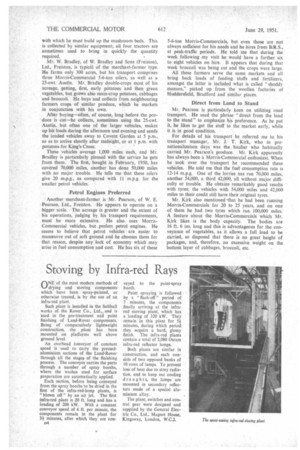Farmers' Vehicles Run Large
Page 60

Page 61

Page 62

If you've noticed an error in this article please click here to report it so we can fix it.
Lileages
incolnshire Farmers prefer o Use their Own Vehicles rn C Licences to Take heir Produce to Market : r,000 Miles Per Week Per /chicle is the Usual Figure says H. Scott Hall, m.i.Mech.E., M.I.R.T.E. RAILWAY facilities in a large area of Lincolnshire are adequate for agricultural needs, in consequence the farmers' use of road transport in that area is correspondingly great. It has been the custom for many years to send produce direct by road to the principal markets in London, Birmingham, Lancashire and Yorkshire.
Formerly, the farmers were accustomed to utilize hauliers for this work. When nationalization came they turned to British Road Services, in the expectation of getting equal, if not better, service. They were disappointed and the majority of them is finding that the facilities offered do not measure up to those to which they have been accustomed.
It is now, therefore, becoming usual for farmers to purchase their own vehicles and operate them under C licences, employing B.R.S. in peak periods and when the produce to be Carried is beyond the capacity of the vehicles they find it economic to own. They also use the -service of local hauliers when the distances to be covered are within 25 miles radius.
The dissatisfaction with B.R.S. was so prevalent that I deemed it worthwhile to inquire deeply into it. It seems that the deficiencies may be summed up in one word, "rigidity." The service offered is not sufficiently flexible and cannot accommodate itself to meet the ' farmers' ever-varying and frequently unpredictable needs. One example can be quoted. A farmer may ring up
B.R.S. with an order to pick up a miscellaneous load of produce, some boxes of this, nets of that, bags of some thing else, but would prefer not to state the quantities, for he cannot know until the time of collection arrives what he will be able to cut and have available for dispatch. An order of that description is not acceptable to the ,B.R.S.; it must specify how many boxes, nets, bags, etc., of each commodity are to be carried so that the driver's work ticket can be made out accordingly.
Moreover, if, when the driver and vehicle arrive, there be any difference between the numbers specified and
those actually offered, the driver will he unable to vary his instructions accordingly. If there be more boxes, etc., than specified on the ticket, he will refuse to take them. If there be fewer, he may find himself unable to accept the load.
Again, the farmer may state a time, convenient to himself, when he would like the vehicle to collect the produce and knows that it will be ready at that time, but not before. If the time be not convenient to B.R.S. the vehicle may come an hour earlier, in which -case the produce will not be ready and the vehicle may not be able to wait, or one hour later, which may mean that it may be too late for the market.
Transhipment of goods is another condition of B.R.S. transport which the farmer intensely dislikes. He does not want his goods to be handled more than is necessary, for he knows that they would suffer by this. Moreover, the delay involved probably means that the goods will be late in getting to market, which may affect the price paid for them. Delay may also depreciate the quality of the produce It may be suggested that in all these things B.R.S. are justified in their attitude. A large organization is necessarily not so flexible as a small one, and if an order ticket be made out, as it must be, according to routine instructions, the driver must not be in a position to vary that order. The times of col lection by lorry cannot be varied to suit the requirements of individual farmers. Transhipment is an essential process of making up bulk loads of varied consignments.
The farmer's reply is that he had precisely the service he desired when he was dealing with free enterprise, and he cannot understand why he should not obtain similar facilities under the new regime.
Whatever may be the rights and wrongs of the situation, whoever may have justice and right on his side, the outcome is that farmers, finding that hauliers cannot undertake their traffic, are so dissatisfied with the alternative that they are buying their own vehicles.
Centralized Marketing It appears that the bulk of the traffic is handled by a minority of farmers, those who act in the dual role of farmer and merchant. They farm their own holdings and buy the produce of other smaller farmers, which. they convey to market in their vehicles. Whether this tendency for farmers to become merchants, and in a way to centralize the marketing of produce, is the outcome of the new transport needs, I cannot be sure, but it seems certain that this trend is increasing. These merchant-farmers collect from their farmer customers during the afternoon and evening, bulk the produce and send it to market by night
Sometimes small vehicles of 25-30-cwt. capacity are used, but not always. Often collection is carried out by the same vehicles that do the long night journeys, other drivers being employed during the day.
For night work the vehicles used are 5-6-tonners of the 30-m.p.h. type; the latter condition is essential because of the distances run. The vehicles cover not less than 1,000 miles per week throughout the year and have to be good if they are to do the work without breakdowns and loss of use.
A typical example of a farmer who is not a merchant is Mr. Reg. Grant, of East Heckington, Boston, Lincolnshire. He farms 350 acres, mostly arable, and his produce is as considerable in its variety as it is in its quantity. The bulk is sugar-beet, about 480 tons a year, potatoes 700-750 tons, cabbages, broccoli and grain.
He makes a speciality of mushroom growing and has a considerable area under glass, in which he cultivates cucumbers, tomatoes and flowers. Another of his specialities is asparagus, he also grows celery, rhubarb, _peas and strawberries. There are 46 head of cattle, 200 pigs and 2,000 hens.
For his transport Mr. Grant uses two 5-tonners, a modern Bedford and an American W.D.-type Ford. He has four David Brown tractors, one Fowler crawler tractor and a small Bean tractor. The David Brown machines are used with trailers for a good deal of local haulage. The Bedford and the Ford carry potatoes, cabbages, broccoli and so on to London, Birmingham, Yorkshire and Lancashire, each of them averaging over 1,000 miles per week. Generally, the produce is brought in from the field by a tractor and trailer, loaded on to the lorry, which sets off at about 8 p.m. for the distant market, returning by noon next day, when the driver goes to bed to rest for his journey next evening. This is the routine side. The loads often contain boxes or baskets of the smaller traffics mentioned, especially mushrooms.
Celery, rhubarb, peas and strawberries go to Boston for canning, and for that traffic heuses a tractor and trailer.
Beet Haulage
Sugar-beet is taken to two factories, at Spalding, 20 miles away, and Bardney, 26 miles away. One of the 5-ton lorries carries the beet to Bardney and is chosen for that work because the route includes some fairly steep hills. For the Spalding run, which is flat, a tractor and trailer are used. During the season, each vehicle will probably do two journeys per day, but whether that can be kept up depends upon the permits issued by the sugar-beet factory.
There is no shortage of back loads for vehicles visiting distant markets; they pick up feeding stuffs for the cattle, pigs and hens, fertilizers and, occasionally, such loads as discarded egg boxes picked up at Newark and brought in to serve as a means for packing celery
Wheat and other grain crops are combine-harvested and sent to a granary in Boston for drying. For that he uses David Brown tractors and trailers Another load of an unusual type is manure from Newmarket,
with which he must build up the mushroom beds. This is collected by similar equipment; all four tractors are sometimes used to bring in quickly the quantity required.
Mr. W. Bradley, of W. Bradley and Sons (Freiston), Ltd., Freiston, is typical of the merchant-farmer type. He farms only 300 acres, but his transport comprises three Morris-Commercial 5-6-ton oilers, as well as a 25-cwt. Austin. Mr. Bradley double-crops most of his acreage, getting, first, early potatoes and then green vegetables, but grows also main-crop potatoes, cabbages and broccoli. He buys and collects from neighbouring farmers crops of similar produce, which he markets in conjunction with his own.
After buying—often, of course, long before the produce is cut—he collects, sometimes using the 25-cwt. Austin, but often one of the larger vehicles, makes up his loads during the afternoon and evening and sends the loaded vehicles away to Covent Garden at 5 p.m., so as to arrive shortly after midnight, or at 1 p.m. with potatoes for King's Cross.
These vehicles average 1,000 miles each, and Mr. Bradley is particularly pleased with the service he gets from them. The first, bought in February, 1950, has covered 70,000 miles, another has done 50,000 miles with no major trouble. He tells me that these oilers give 20 m.p.g., as compared with 11 m.p.g. for the smaller petrol vehicles.
Petrol Engines Preferred
Another merchant-farmer is Mr. Pearson, of W. E. Pearson, Ltd., Freiston. He appears to operate on a bigger scale. The acreage is greater and the extent of his operations, judging by his transport requirements, must be more extensive, He also uses MorrisCommercial vehicles, but prefers petrol engines. He seems to believe that petrol vehicles are easier to manceuvre out of soft ground and he chooses them for that reason, despite any lack of economy which may arise in fuel consumption and cost. He has six of these
5-6-ton Morris-Commercials, but even those are not always sufficient for his needs and he hires from BIR.S., at peak-traffic periods. He told me that during the week following my visit he would have a further six to eight vehicles on hire. It appears that during that week broccoli was being cut and the crops were large.
All these farmers serve the same markets and all bring back loads of feeding stuffs and fertilizers, amongst the latter is included what is called "shoddy manure," picked up from the woollen factories of Huddersfield, Bradford and similar places.
Direct from Land to Stand Mr. Pearson is particularly keen on utilizing road transport. He used the phrase "direct from the land to the stand" to emphasize his preference. As he put it, he likes to get the stuff to the market early, while it is in good condition.
For details of his transport he referred me to his transport manager, Mr. J. T. Kirk, who in prenationalization days was the haulier who habitually carried Mr. Pearson's produce. Mr. Kirk apparently has always been a Morris-Commercial enthusiast. When he took over the transport he recommended these vehicles. He told me that the fuel consumption rate is 12-14 m.p.g. One of the lorries nas run 70,000 miles, another 54,000, a third 42,000, all without major difficulty or trouble. He obtains remarkably good results with tyres; the vehicles with 54,000 miles and 42,000 miles to their credit still have their original tyres.
Mr. Kirk also mentioned -that he had been running Morris-Commercials for 20 to 25 years, and on one of them he had two tyres which ran 100,000 miles. A feature about the Morris-Commercials which Mr. Kirk likes is the body capacity. The bodies are 16 ft. 6 ins, long and this is advantageous for the conveyance of vegetables, as it allows a full load to be carried, so disposed that there is no great height of packages, and, therefore, no excessive weight on the bottom layer of cabbages, broccoli, etc.












































































































































